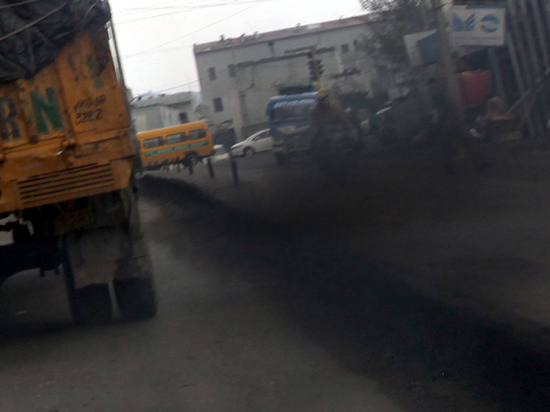*Alarming rise in vehicular population major cause
Mohinder Verma
JAMMU, Dec 13: Shocking it may sound but it is a harsh reality that health bomb is ticking in winter capital city as air pollution is continuously increasing during the past several years mainly because of unchecked addition in the already burgeoning vehicular population. However, the concerned authorities have yet not paid any serious attention towards the prevailing situation, which will go beyond the control if corrective measures are not taken immediately.
The intensity of the air pollution can be gauged from the fact that both Respirable Suspended Particulate Matter (RSPM) and Suspended Particulate Matter (SPM) levels in Jammu city air are not only beyond the permissible limits but are continuously increasing with every passing year.
Official sources told EXCELSIOR that for measuring air pollution levels the Jammu and Kashmir State Pollution Control Board has established 10 dedicated centres under the National Air Quality Monitoring Programme (NAMP) of the Union Government.
Of these 10 centres, three have been established in Jammu, four in Srinagar and three in Ladakh. Each of these centres is put in operation for 24 hours in a week to measure the air pollution and the data being generated by these centres is shared with the Central Pollution Control Board (CPCB) for being taken into consideration during environment planning.
In Jammu, one each centre has been established in the Regional Office of the State Pollution Control Board at Narwal, MA Stadium and Industrial Estate Bari Brahmana. The air pollution is measured by adhering to four parameters—RSPM (Respirable Suspended Particulate Matter), SPM (Suspended Particulate Matter), NO2 (Nitrogen Dioxide) and Sulphur Dioxide (SO2). All these are measured in Microgram Per Cubic Meter.
As per the monthly average, the permissible limit of RSPM is 100 mg, SPM is 200 mg and SO2/NO2 is 80 mg while as per annual average, the permissible limit of RSPM and SPM is 60 mg while as that of SO2 and NO2 is 50 and 40 mg respectively.
According to the annual average data of State Pollution Control Board, during 2013-14 year, the RSPM was recorded at 113 mg, SPM 210 mg, SO2 3.2 and NO2 13.3 mg at the centre established at Regional Office of the Board at Narwal. However, during the 2014-15, this centre recorded RSPM at 132 mg and SPM 238 mg, which clearly establishes sharp increase in levels of RSPM and SPM in the air. However, there was no major change as far as NO2 and SO2 are concerned as the same were recorded at 3.2 mg and 13.9 mg during 2014-15.
Similarly, during 2013-14, the RSPM and SPM levels were recorded at 124 mg and 220 mg respectively by the centre at MA Stadium while as these levels increased to 127 mg and 234 mg respectively during 2014-15. There was no major change in the SO2 and NO2 levels in the recordings made by the centre at MA Stadium during 2013-14 and 2014-15.
As per the data, the RSPM and SPM levels were recorded at 139 mg and 231 mg by Bari Brahamana Industrial Estate centre during 2013-14 while as SPM level increased to 238 during 2014-15. The NO2 and SO2 levels recorded by this centre during these two years were higher than those recorded at the centres of MA Stadium and Narwal.
The Respirable Suspended Particulate Matter is produced from combustion process, vehicles and industrial sources and Suspended Particulate Matter consists of dust, fumes, mist and smoke. The origins of SO2 and NO2 are thermal plants and fire wood burning that is why their levels are not increasing in comparison to RSPM and SPM because the number of thermal plants is negligible and fire wood burning practice is also not much prevalent.
The data clearly establishes that RSPM and SPM levels in the air of Jammu city are continuously increasing with every passing year and sharp rise in the number of vehicles particularly those operating on diesel is the major factor contributing in the same.
According to the scientists of the State Pollution Control Board, RSPM are finer particles, which, when inhaled, can cause damage to lungs and exposure to these can irritate lungs and can cause lung constriction, shortness of breath and cough and it aggravates asthma and other respiratory problems. “RSPMs are more dangerous to health because they are much small than SPM”, they said.
As per the doctors, these superfine particles can penetrate deeper into the lungs and can make inhaler more prone to heart diseases, chronic bronchitis, asthma and even lung cancer.
However, all the concerned authorities in the State have yet not woken to the situation and are watching the continuously increasing air pollution as mute spectator, official sources said. This can be gauged from the fact that the data being generated by the centres of the Pollution Control Board is being only shared with the Central Pollution Control Board for consideration during environment planning at the national level but all the concerned departments in Jammu and Kashmir never bothered to have critical analysis of the same.
“The Forest Department, which is required to deeply analyze the air pollution data to take corrective steps by ensuring large scale plantation of trees, never bothered to conduct any study in this regard”, sources regretted, adding “similarly, the Transport Department, which is issuing registration to the vehicles, too remains non-serious towards the increasing air pollution”.
All this indicates that health bomb is ticking in winter capital city and those who are required to take corrective steps are sleeping over the matter.


